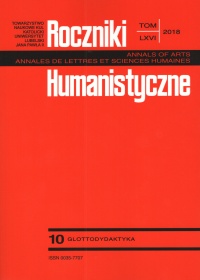Lessons of Polish to Foreigners of Generation Y. Teacher, Trainer or Language Coach?
Abstract
The article focuses on problems associated with teaching Polish as a foreign language (PFL) to employees of foreign companies investing in Poland. Globalization and job mobility, made necessary learning languages that do not have the so called economic power. Teacher of Polish deals with foreign employees – representatives of Generation Y of the other cultures. People known as „Generation Y”, growing in the era of informatic technologies and rapid access to knowledge appear as competent participants of Polish courses. We see, if the existing civilization, culture and development differences point the diversity of the global Generation Y, still the mentioned Generation has a common dimension – the command of digital technology, Internet and social media..
This article approximates problems of language teaching Polish in international corporations from characteristics and needs of the foreign learner of PFL a representative of Generation Y, to the experience of qualified Polish language teacher, who changes qualification to a professional trainer or a coach for doing services of developing practical language skills.
References
Akbaba-Altun S., 2006, Complexity of Integrating Computer Technologies into Education in Turkey, „Educational Technology & Society” 9 (1), p. 176-187.
Brooks N., 1964, Language and Language Learning, New York.
Coste D., North B., Sheils J., Trim J., 2003, Europejski system opisu kształcenia językowego: uczenie się, nauczanie, ocenianie, Warszawa.
Engin D., 2013, Generation „Y” in Turkish context: Multiple foci research, “International Journal of Business and Management Studies” V, No 1.
Komorowska A., 2005, Metodyka nauczania języków obcych, Warszawa.
Przetacznik-Gierowska M., Włodarski Z., 1998, Psychologia wychowawcza, Warszawa.
Sajenczuk M.E., 2015, Relokacja, mobilność, indywidualizacja jako czynniki mające wpływ na zmianę podejścia i wprowadzanie innowacji w nauczaniu dorosłych cudzoziemców jpjo i kpjo na przykładzie współpracy z Cartus Intercultural & Language Solutions, z korporacjami łódzkimi i kierunkiem Gender Studies na UŁ, w: Nauczanie języka polskiego jako obcego – tradycje i innowacje, red. W. Próchniak, M. Smoleń-Wawrzusiszyn, Lublin 2015, s. 347-364.
Smolbik-Jęczmień A., 2013, Rozwój kariery zawodowej przedstawicieli pokolenia X i Y w warunkach gospodarki opartej na wiedzy, „Nierówności społeczne a wzrost gospodarczy” nr 36, s. 228-238.
Trendak O., 2013, Dobry nauczyciel, czyli kto?, „Języki Obce w Szkole” nr 3, s. 59-64.
Copyright (c) 2018 Roczniki Humanistyczne

This work is licensed under a Creative Commons Attribution-NonCommercial-NoDerivatives 4.0 International License.





